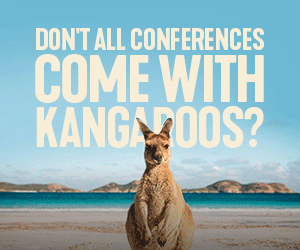Value-Add to the Member-Experience and Long-Term Sustainability of your Association by Moving towards Outcome-Oriented Events

In this final chapter of ESAE's regular segment, Chloe Menhinick shares with HQ about event legacy planning, differentiated stakeholder engagement & converging the offline & online experiences, and embracing the green generation.
 As the landscape of associations continues to change, we are experiencing a transformation in the way we do business and the way we engage with our stakeholders. The traditional motivators for members to join associations are for learning opportunities and the formation of community connections. Association meetings and events- where professionals from different sectors, disciplines and geographies can converge around a focussed topic to accelerate the exchange of knowledge, learning and professional development, is where these primary motivators can be realised.
As the landscape of associations continues to change, we are experiencing a transformation in the way we do business and the way we engage with our stakeholders. The traditional motivators for members to join associations are for learning opportunities and the formation of community connections. Association meetings and events- where professionals from different sectors, disciplines and geographies can converge around a focussed topic to accelerate the exchange of knowledge, learning and professional development, is where these primary motivators can be realised.
Although increasingly challenged by competition from for-profit companies, technological offerings that facilitate people to connect online, and national policies that may affect international travel for conferences, association meetings and events continue to deliver face-to-face networking and learning experiences that members value and thus will continue to be a, if not the key, forum in which member value is reinforced.
However, attendee preferences and expectations are evolving, and rapidly. As millennials increasingly dominate the workforce, these challenges to the status quo will only intensify. Decisions to join an Association will be determined not just by the face-to-face networking and learning opportunities available but also by values such as inclusivity, innovation, authenticity, legacy and impact. The event experience will similarly be determined by these values.
Keeping abreast of changing member expectations and what they mean for how Association meetings & events are designed, will help ensure that Associations are able to continue to deliver member value through the execution of exceptional, memorable and legacy-affirming event experiences.
Deliver tangible results with a positive impact through event legacy planning and differentiated stakeholder engagement
The increasing demand for more benefits for the host destination and overall positive impacts for all stakeholders requires changing the ways events are planned and implemented. By designing a long-term structure for the event with future goals, legacy planning will become a vital tool to survive in this more demanding environment.
As part of this process, the building of long-term partnerships and transparent relationships to ensure both knowledge transfer and economic impact for associations will become a critical component of work for Associations. In this light, sponsors will increasingly be engaged as key partners. Sponsorship relationships and programmes will need to be designed to help demonstrate the authenticity of your Association’s brand by engaging with your sponsors as long-term stakeholders actively contributing to delivering on your Associations mission and vision.
Likewise, where events have in the past often failed to engage or draw people in, designing your event sessions towards a specific outcome will help ensure that sessions become thoughtful spaces for dialogue and professional learning and that the event becomes just one point on a longer journey contributing to your Association's mission.
As event experiences will increasingly be judged on their legacy, understanding how to create value and just as importantly capture and communicate that value and the legacy that the event is leaving behind will become increasingly necessary. For this, measuring the success of your event will require the introduction of metrics which go beyond the traditional event KPIs to also reflect your key legacy objectives.
Lead your association towards the transition to Circular Economy: Embrace the new green generation
The narrative in sustainability is increasingly focussing on the concept of the circular economy which has the potential to solve the world’s mounting waste problem by doing away with the very concept of waste altogether. Indeed, the transition towards a circular economy is much more than just another buzzword in the world of corporate sustainability - start-ups and big companies alike already are experimenting with the concept to forge new business models and buttress existing ones.
Millennials will be heavily involved in the way the world achieves its circular economy aspirations, and as millennials’ influence in Association life grows, they will, in turn, become increasingly influential in how Associations shape their sustainability frameworks in the future. Their habits and expectations as socially conscious consumers will mean that organisations with better sustainability credentials will gain a greater competitive advantage over those with less sustainable practices.
As major consumers in the events industry, Association’s have an important role to play in the transition to a circular economy. Associations have no option but to jump onto the circular economy train that has already taken off and start considering their event design strategies within the circular economy framework. This will require a step-change in how they engage with host city event bureaus and the key suppliers across the entire breadth of the event- design and management supplier chain- from the food choices, waste management, exhibition construction companies to branding and signage.
Deliver on learning objectives through quality content delivered in exceptional ways
Innovations in how content is distributed and how it contributes to knowledge sharing and learning is also driving a paradigm shift in event design. In our digital, networked society, people share content more freely and are pushing increasingly for open access; the Freemium model has created opportunities for quality content to be accessed at no cost, forcing business to move away from the traditional content-for-cash approach to optimise alternative revenue streams. Content has become available through a myriad of channels, virtual platforms and social media. Alongside these changes, paradigm shifts are taking place in the education experience. Learning is increasingly occurring through a mix of formal, informal and experiential learning.
What does this mean for the event experience? Content remains king however it is no longer just a question of what professionals are learning, but also how they are learning. Association events must provide for the coexistence of a plurality of approaches, which consider the event delegate as an active subject and not simply a passive subject.
Association events will need to ensure a blended learning approach forms a central component of its content and learning strategy –using new technologies, social interaction and the sharing of experiences to bringing an effective knowledge sharing culture to life before, during and after an event.
Use technology to empower your delegates and extend your influence
Obviously incorporating technology into events is not new, but how delegates expect to interact with it is. Instead of occupying their attention, delegates will expect technology to enhance their experience by solving their problems, smoothly connecting them to your content and deepening their engagement with the network. Embracing technological opportunities such as Artificial Intelligence, Virtual Reality and Chatbots to name just some of the key emerging technological trends in events, offers the potential to connect your attendees with your event more quickly and efficiently than ever before. Where financial resources and technical know-how is limited, form partnerships with expert companies occupying this space to ensure your resources are spent most effectively towards delivering on unique member engagement opportunities.
Converge the Offline and Online Experiences
Technological developments also offer Associations the opportunity to use events to engage non-attendees through online activities. The live streaming of sessions, live reporting and soliciting questions from the online community, can break the barriers of not just time and distance, but also the cost on a member’s ability to engage.
And so Associations can embrace technology to create virtual meeting places and let virtual attendees actively participate in discussions and the event journey. Digital hangouts can add a new dimension to networking and interaction. These hangouts can be accessed at any time during the event to engage other participants, speakers, and virtual audiences. Importantly, this increases accessibility for those who find it difficult to travel and extends the reach of your Association to new audiences in regions or demographics previously under-represented at your events and in your membership.
Conclusion
Events are a pivotal opportunity to showcase new global trends- in society and in technology. As such, events have the power to play a crucial role in showcasing how Associations are still relevant in today’s world. Associations need to rise to the challenge of differentiating themselves by delivering exceptional events which include opportunities for extended experiences both offline in local communities and online in the digital space. They need to be able to demonstrate the impact made on their bottom line not just in monetary terms but also in terms of the depth of their stakeholder engagement and sustainability strategy. They need to embrace technology as a core component of their strategy to empower delegates, enrichen their learning experiences and extend their influence to an online audience that has the potential to reach far beyond conventional audiences. And finally, to meet the challenges many Associations are facing in terms of defining a unique member value proposition, moving towards outcome-orientated events will ensure that your Association’s events continue to add value to the member-experience and long-term sustainability of your Association.

Other Articles
About Us
Supported by the Union of International Associations (UIA), the International Association of Professional Congress Organisers (IAPCO) and the Interel Group, the global public affairs and association management consultancy, Headquarters Magazines serve the needs of international associations organising worldwide congresses.















